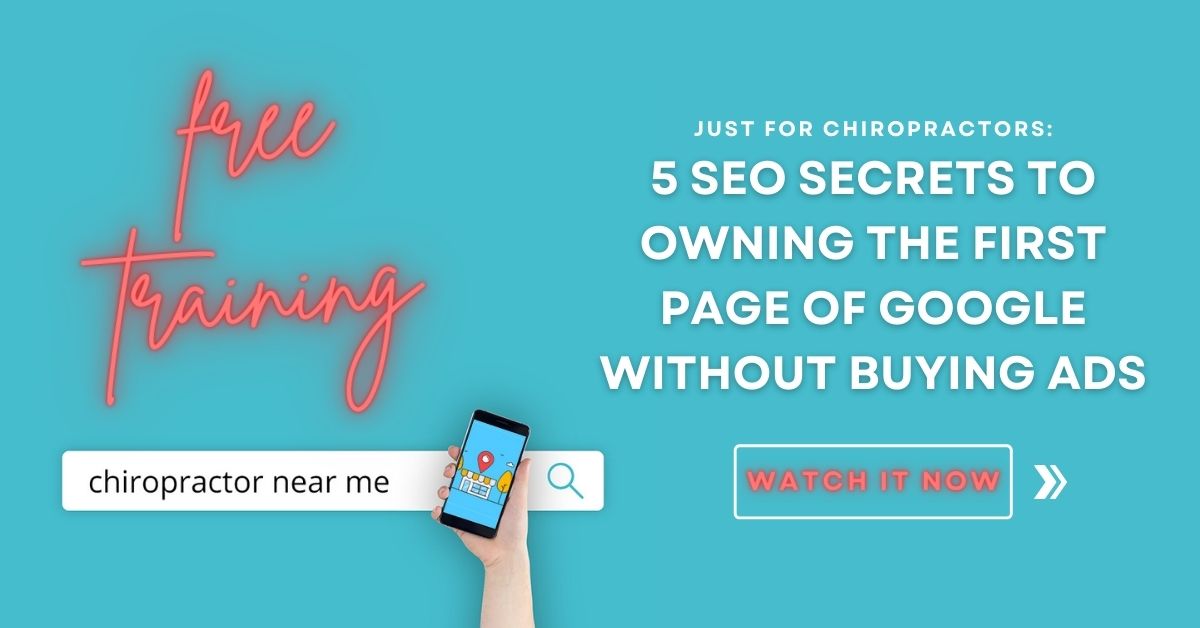Is content still king? We're going to revisit the relevance of Bill Gates' famous quote, "Content is king," which he coined in 1996. With the evolution of search engines, AI, and social media, is content still king or merely a Tik-Tok dancing jester of the royal court?
We’ll explore recent Google algorithm updates and answer the question, what does Google really think about AI content?
We've also got a couple of key tips that can help your content cut through the noise and genuinely resonate with your true target audience.
Are you ready to make your clinic's content the star of the online atmosphere? This episode promises to equip you with effective strategies to create compelling, audience-centered content and optimize it for SEO.
Show Notes
In this episode, you’ll learn about:
- How you can make your content stand out in a content-cluttered world
- About the evolution of content in the world of AI
- About an important Google Algorithm update that we’ve discussed before
- What it means to create helpful content
- And more
Listen to the audio version:
Watch the video version:
Selected links and other resources related to this episode:
- Propel Your Practice Podcast
- Propel Marketing & Design
- 3 ChatGPT Mistakes That Can Hurt Your Clinic’s Marketing & SEO
- Surviving and Thriving After Google’s Algorithm Changes
- Canned Content: Should You Use It and If So, How?
- Writing for SEO: 8 Simple Steps for Writing Killer SEO Content
- 12 Content Marketing Best Practices That Drive More Traffic & Conversions
- Buyer Personas: Your Guide to Better Customer Connections
- 5 SEO Secrets to Owning the First Page of Google Without Buying Ads
If you're a clinic owner looking to get more traffic to your website and improve your online presence, then you're in the right place. On the Propel Your Practice Podcast, we provide chiropractors, physical therapists, and other clinic owners with actionable digital marketing strategies, including local SEO and effective website best practices. You'll learn simple and actionable solutions to help your clinic rank on Google and beat your competition. Together, let's propel your practice.
In 1996, Bill Gates coined the phrase “content is king,” but is that still true today?
Hi, I'm Darcy Sullivan from Propel Marketing & Design, and I am so excited to have you here with me on this episode of the Propel Your Practice Podcast.
Some of our episodes are long, and some of our episodes are short. I think you'll find this one to be a little bit shorter. I would love to hear from you, though. You can find us on Instagram at @propelyourcompany. I wanna know: do you like short podcast episodes or long podcast episodes? Do you like to hear more about the topics of content marketing or more about strategies related to SEO?
We're talking a little bit about both of those today. We're asking the question: is content still king? So, as I mentioned before, back in 1996, Bill Gates coined that phrase, but let's be honest, there's so much more content out there and resources now than there were back in 1996.
In fact, it's kind of interesting. He coined the phrase “content is king,” and then everyone in the search engine optimization field (SEO) said, “Well, if content is king, then SEO is queen, and she's really the one that rules the house.”
Kind of interesting how that took place. And now, though, with AI and with social media being at the extreme level they are and have evolved the way they are now, almost feels more like content can sometimes be a joke, more of a court jester with all the foggy AI content or TikTok dances, than one would consider it being the king that rules.
So that's what we're talking about today, and, in fact, I'm gonna give you a couple simple tips and things to keep in mind to make sure that you really are making some of that quality content that's gonna help you stand out from those jesters that are just out there throwing out content for the sake of content.
And in order to do this, the very first step that we wanna take before we push “post” on a new piece of content on our website, whether it's on our website, a blog post, an email blast, and you can even keep this in mind when it comes to social media or a video- we wanna take a step back, and we wanna look at the content through the lenses of our target audience and ask a few questions.
First, will they walk away feeling as though we have not wasted their time?
This might sound simple, but with so much content out there, we need to make sure that your content is going to stand out, and I think that sometimes people look at it the wrong way, in a couple different directions.
One, when you're an expert in the field of something, whether you're a doctor or clinic owner, or you work at a clinic, or you've just been so involved with something for so many years, you look at things through a very different lens than somebody who is just getting familiar with that topic.
An example here would be when we work with chiropractors or the clinic owners, and they do a lot of doctor talk, which is important, and it definitely puts them in that position of being an authority figure. But we don't want to overwhelm the audience, so we sit, want to sit there, and we want to put on the lenses that our target audience would look at when they're reading through the blog post when they're reading through a page on our website and say, “Are they really getting value from this?”
Because, again, there is so much content out there that if somebody lands on your blog post and it isn't organized in a way that's easy for them to scan, or if you did a little clickbait and you told them you were going to supply them with three simple steps to do fill-in-the-blank and they get to that page and it's not what they were expecting, they're just going to leave and jump away.
So we want to say, “Does this really add value? Is it easy to understand? Does it meet the promise that was set forth by the title or the introduction?”
Now, that does not mean that you should not leverage AI, but you want to be sure to use AI in the proper way. Now, we did a podcast on ChatGPT, you can jump over and listen to that, and we'll include that in the Show Notes, and we will also include some other resources that we're going to mention here a little bit later.
But back in 2022, Google did an algorithm update, and Google does algorithm updates all the time, but this one was its Helpful Content update, and I was originally going to record this podcast back then (a different variation of it), talking about, well, what exactly is helpful content?
This really does relate to this because you'll see there's an overlap. Now, again, Google does updates all the time, but when you write content for your target audience, providing them value and providing them with information that they assume is going to be on that page–meaning, again, you didn't say I'm going to give you three simple steps to do fill-in-the-blank, and then the content be something completely different–Google is going to reward you.
Google has blatantly stated that the content that it wants to serve people needs to be the best viable match for what somebody is searching for. Best viable match. That means that if you are creating quality content (that means what somebody is searching for), Google is going to want to serve it up directly to your target audience. And although there is so much content out there, all of the AI content out there can be a little redundant and not personal, so keep that in mind.
If you are using your AI resources, again, I'm not saying don't use them but make sure that you're adjusting what information has been delivered to you through these AI sources and that you make it your own, and you format it and that you optimize it before you put it on your website.
Now, if you're not familiar with optimizing a website or SEO, please be sure to check out the free training that we have on the Five SEO Secrets to Owning the First Page of Google Without Buying Ads. You can find that by visiting propelyourcompany.com/learn
But going back and taking directly from what Google says, Google wants you to write for your target audience, and then you do have to go back and optimize to make sure it's easy for your audience to find that content. That's where SEO comes in.
But we want to start by again going to that content and sitting down, whether it's a blog or a page on your website, and saying, “If I were at the target audience coming to this page, is the content helpful?”
If you can walk away and say, “Yes, somebody is going to take away prominent information from this and find what they're searching for,” and again, it needs to be laid out in a way that makes it easy to scan.
We talk about this all the time with SEO, using your header tags, using bullet points. We need to make sure that your content not only showcases the information needed, but that it's laid out properly, and if you can say yes to that, that is great because, again, we want to have people have a satisfying experience when they come to your website or to your blog.
We want to write with that people-first approach, creating content directly for your target audience and then making sure that it's optimized for those best SEO (search engine optimization) factors. So are you exclusively using AI or just purchasing canned content? Do you see how that puts you at a disadvantage?
And we had another episode that we'll link in those Show Notes that talked about canned content and the pros and cons of using it. But we want to make sure that your content is fresh.
We want to make sure that you're not just summarizing what other people have said because that doesn't add value, and sometimes when you pull AI content, that's all it does. It basically summarizes what other people have said. So it's nothing new. It's nothing that really adds value. Does the content make your readers feel like they need to do an additional source for better information?
So if your blog post, again, was on three simple solutions to fill-in-the-blank, we want to make sure that the content on that page matches that information and that somebody isn't going to come to your site and say, “This isn't really what I was thinking that I would find related to this topic,” or “This isn't organized in a way that makes it easy for me to understand. Boom, I'm going to leave.”
We also want to make sure that you're not just writing to meet a particular word count because Google stated it does not have a preferred word count. And people have asked many times how long should content be- like, how long should your blog post be?
And our response is that long-form content usually provides a better return because long-form content gives you a better chance to dive into a specific topic and provide more value. We also want to make sure that your content matches a promise.
So if you said that in your content, you were going to answer a specific question, that you actually answer it, and you don't just talk around the topic. Pretty simple stuff here.
Basically, we want to make sure that the content you're developing is fresh, that it meets the user where the user is at. And those are some of the biggest takeaways. So keep all of this in mind when you're putting together your content so that your content can be king and not the jester of the court.
Well, hey, before we head out, I want to invite you to join in on a free masterclass I put together on the 5 SEO Secrets to Owning the First Page of Google Without Buying Ads.
You can find a link to sign up for this free masterclass in the Show Notes for this episode or by visiting propelyourcompany.com/learn. During this workshop, we do a deep dive into strategies to help you improve your online presence, including your Google Business Profile, that's what used to be called the Google My Business listing and what controls the Google Maps section, along with how voice SEO plays a big role in today's search and where you should be focusing your efforts online for the biggest impact.
All right, well, that's it for today. Again, you can join the masterclass by visiting propelyourcompany.com/learn. Thanks so much for your time. I'll talk to you soon.
Darcy’s SEO strategies are easy to implement and effective. She’s the #1 SEO expert I refer to whenever I need help with my rankings.
SEO queen! I can’t thank Propel and Darcy enough for holding my hand through the SEO process! I’m loving the podcast and all the insight! Also loving that my business is now getting the brand awareness and sales I’ve always wanted!
Wow! Clear, concise and impactful. Excellent details and tips - already seeing a return!! Worth the 20 min listen.
Get our next podcast episode delivered directly to your inbox:
We'll email you when we release new episodes.
Sponsors
This episode of the Propel Your Practice Podcast is brought to you by Propel Marketing & Design. Propel Marketing & Design helps Chiropractors, Acupuncturists, Physical Therapists, Wellness Practitioners, and other clinic owners improve their website rankings.
Do you have a suggestion for an upcoming topic or guest?
We love a good suggestion and we’re happy to take yours! Tell us about a topic you want to hear more about or a guest you think would make an impact here and we’ll take care of the rest.
Interested in sponsoring a Propel Your Practice Podcast episode?
If your organization would be a good fit for our target audience, we’d love to work with you. Hit the link below and let’s talk.










![How to Write a Professional Chiropractic Bio [Template Included]](https://propelyourcompany.com/wp-content/uploads/write-a-bio-500x383.jpg)

